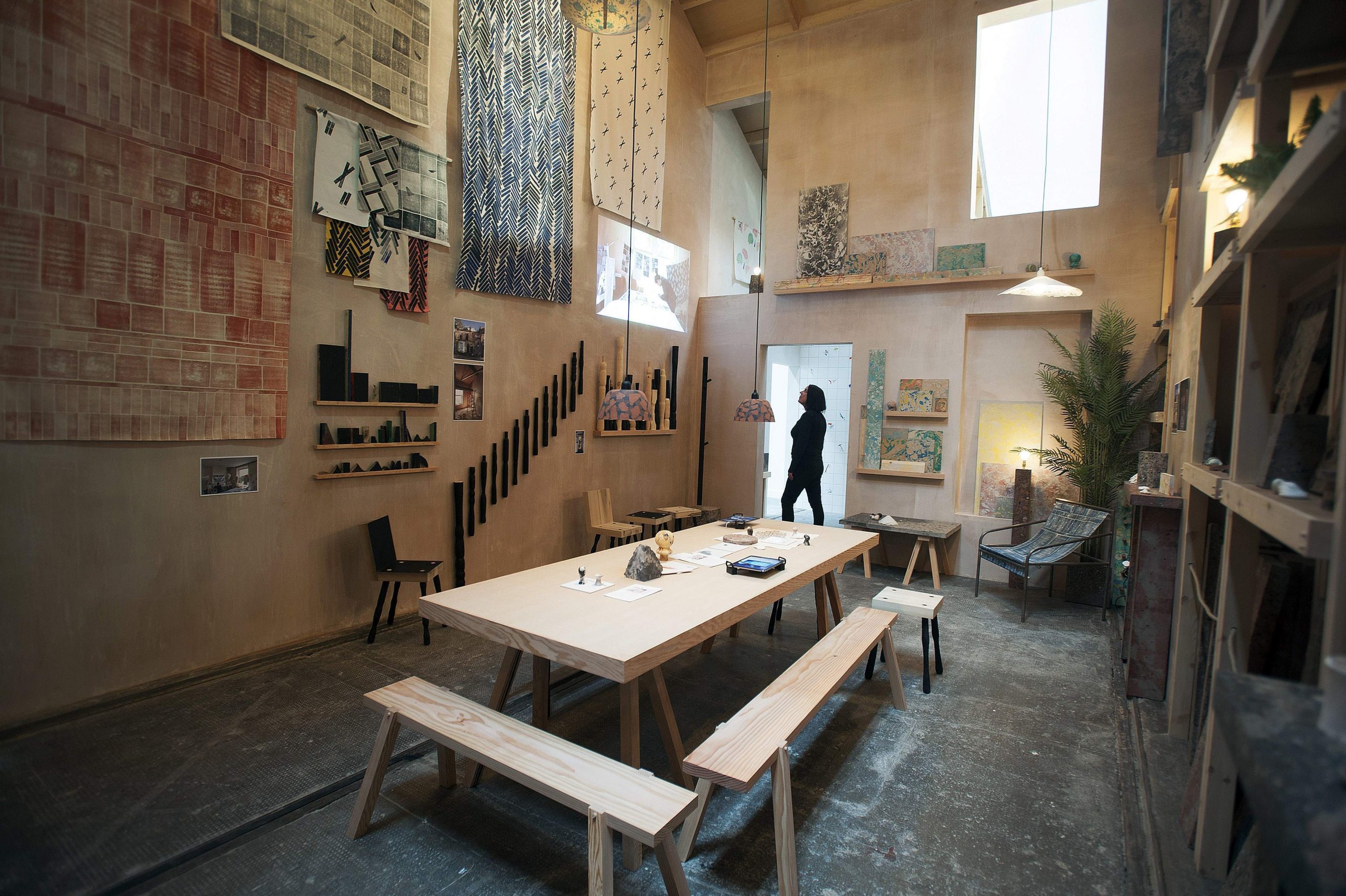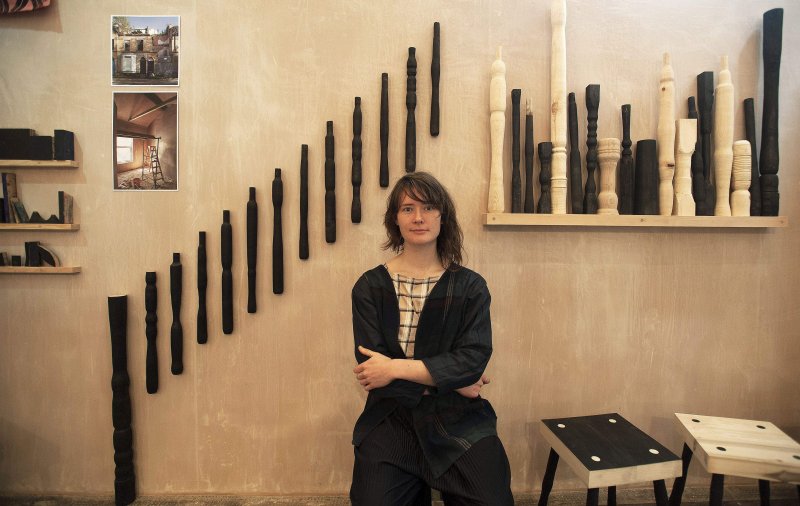
“Shall we play fives?” Lunch is over at the offices of Assemble, and a big decision awaits: who’s making tea? There’s a rota for lunch duties marker-penned on a whiteboard, points deducted for slackers. But tea-making is decided with “fives”, a kind of haka-cum-rock-paper-scissors. For a few minutes team-members fight it out with hands, until one succumbs. This is how business is conducted at Assemble’s “Global HQ”, as the gently mocking sign on their front door calls them. They might be nominated for the Turner Prize. They might be redesigning cities. They might be building art galleries and town squares. Life is getting serious. But at the offices of Assemble, it still feels like The Young Ones.
After all, this band of eighteen (“sort-of architects,” explains Assemble member Louis Schulz, “sort-of not, sort-of maybe”) are not long out of college, most in their mid twenties. And I say ‘offices’; but think student digs, lightly art directed. Their utilitarian sheds, lurking by Bow Flyover, east London, are leered at by dead-eyed apartment blocks and other sins of the modern city rising beside the Olympic Park.
Schulz gives me the tour. Inside, the sheds’ shaggy warren hides metal and wood workshops, towering shelves piled with odds and sods, “angle brackets”, John Lewis bags, mouldering mugs, columns of bubble wrap, chunks of buildings, shopping trolleys, assorted unidentified unfiled objects and, behind doors, a sizeable chunk of east London’s cultural community. Assemble sublets to carpenters, ceramicists and theatre designers, as much to balance the books as to have on hand a cultural community to share tea breaks and tips.
For Assemble might be young, but they’re astute. Not many graduates in 2010 would have turned down paid employment after an economic crash to knock up their own temporary community cinema in a derelict petrol station (as you do). Do-it-yourself drew them together. They wanted to build stuff, with bare hands.
British architecture schools notoriously train students sky-high on pretty, impractical dreams who couldn’t masterplan a flatpack shelf let alone a city, most destined for disillusionment as “CAD (computer-aided design) jockeys”, eyes chained to screens. “So unbelievably abstract,” says another member, Paloma Strelitz – of her architectural education, as much as the buildings it produces. Assemble is anything but. “We’re from another era,” Schulz grins. Not Luddites – they have a roomful of Apples – but people who just like making things. They cook up objects and materials (‘rubble-crete’?) at their digs and let them loose on the world.
Their old-skool methods include something passing for Bolshevik radicalism today: they actually talk to the users of the spaces they help create. “It’s simple,” says Schulz, artlessly, “go there, talk to people.” It’s amazing how few architects, though, achieve such Herculean feats.
The project that’s earned them their Turner nomination is the ongoing rehabilitation of four streets of Victorian terraces in Granby, Liverpool, round the corner from Toxteth. Plans for the area “have come and gone,” says Erika Rushton, chair of its community land trust, who’s lived there for 40 years, “and,” she sighs, “come and gone.” Myriad housing policies ‘cleansed’ Granby’s population; the four streets’ residents clung on among “tinned up” houses made intentionally derelict. As the state retreated, residents took charge. Rushton noticed the morale boost when they began clearing their own rubbish, painting their own homes. “Don’t ask permission,” she says. “Just do it.”
Assemble was brought in to finish the job, using local apprentices. “It’s the residents, as much as us at Assemble,” says member Fran Edgerley, “that come up with the ideas.” Like that game of ‘fives’, decisions are made around kitchen tables. Or, on a project at a Croydon housing estate, at a pensioners’ tea dance; “nothing like dancing with residents to break down barriers,” says Shultz. Assemble then forms ideas into a physical shape.

Fran Edgeley from the Assemble collective. Photo: Getty
Such democracy is a slow process of small important decisions, like what fireplace you want; hence it is rarely done these days. Naturally, Assemble decided collectively whether to accept the Turner nomination. Then, naturally, they consulted Granby’s residents, who accepted for the brief limelight Turner might shed on their obscured corner of urban politics (the abandonment, degradation and isolation of such stubbornly ungentrified parts of the inner city having been written out of the story of Britain’s ‘urban renaissance’.)
Assemble is aware of the debt owed for their newfound renown: they are public property. They are written about. What annoys Jane Hall is the “assumption we work for free, that we’re…” “Trustafarians”, suggests Shultz – able to do what they do because they’re well-spoken, mostly Cambridge graduates. But in this age of the intern, Hall insists, no-one there relies on the bank of mum and dad. If they have one unifying cause it’s that the work of architects is “respected and paid properly”.
It doesn’t take much, these days, to be progressive in architecture. For some, Assemble is a figurehead of a renewed interest in the politics of buildings (and, indeed, the politics of art), after 30 years during which architects have naval-gazed about style while the political economy topsy-turvied.

A builder at work in one of the houses in Granby, Liverpool. Photo: Getty
Assemble’s members, though, are hardly Che Guevaras. They talk of “brands”, “logos” and “income streams”. They are entrepreneurial. They make the best of what they’ve got. They, like their generation, have an attractive, wide-eyed faith in direct action and straight talking. They are honest, polite, generous, earnest, fun, and they do good work. Those are miracles enough for now.




